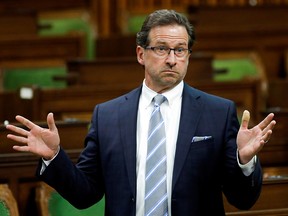Aaron Wudrick: Greedy political parties shouldn't be dipping into the wage subsidy fund
By making a shameless grab for every last taxpayer dollar they can in the middle of a crisis, political parties have helped draw some long-overdue attention to the rigged system they’ve been exploiting for years

Article content
When news broke that four federal political parties had applied for taxpayer support from the emergency wage subsidy program, which was intended to support struggling businesses, it fell to the leader of the Bloc Québécois, of all people, to say the obvious.
“I find it absolutely unacceptable,” said Yves-Francois Blanchet, whose party was the only one not to apply for the subsidy, noting that the Liberals and Conservatives in particular had already raised millions of dollars in donations before the COVID-19 crisis ever hit.
Thankfully, all four Conservative leadership candidates — who are actually looking for support from ordinary Canadians right now — came out against the subsidy and at least two specifically pledged that if elected leader, they would ensure the subsidy was paid back.

Prime Minister Justin Trudeau, on the other hand, didn’t even try to give an explicit justification. And NDP Leader Jagmeet Singh argued that the subsidy is to help out businesses, including non-profits, that have suffered a drop in revenue during the COVID-19 crisis to help save jobs. Hence, if political parties fit the program criteria, why shouldn’t they apply?
To answer that, it’s worth a quick look at just how privileged political parties are compared to any other organization when it comes to ongoing subsidies.
First, uniquely among non-profits and charities, political parties can offer extremely generous tax credits to their donors. If you donate $100 to your local food bank, you get a federal tax credit of 15 per cent, meaning the total federal income tax you owe goes down by $15. But if you donate $100 to a federal political party, you get a federal tax credit of 75 per cent, meaning you save a whopping $75 instead.

This tax credit has meant that since 2016, federal political parties have received $145 million in taxpayer subsidies, or an average of $29 million per year. Add to this the more than $100 million that the parties and their official candidates received in expense reimbursements for the 2015 federal election (2019 figures have not yet been released). The result of all these subsidies is that all taxpayers end up paying for political parties, whether they want to or not.
Some point out that political parties are an important part of our democratic system. But are they really more important than, say, organizations like the United Way, food banks, homeless shelters or the many charities that do important work to improve the lives of the most vulnerable? Is it really more important to make sure political parties have millions of dollars in the bank to bombard us with nasty partisan attack ads every time we turn on the TV or browse social media?
The actual cost of the emergency wage subsidy, which will likely provide the parties with around $500,000, is just the tip of the iceberg. But by making a shameless grab for every last taxpayer dollar they can in the middle of a crisis, political parties have helped draw some long-overdue attention to the rigged system they’ve been exploiting for years. If these parties know what’s good for them, they should pay back any money they’ve received from this program and beg forgiveness for their poor judgment. And they shouldn’t be surprised when taxpayers start demanding an end to the rest of their cozy little subsidy racket.
National Post
Aaron Wudrick is the federal director of the Canadian Taxpayers Federation, which hasn’t taken any taxpayer money during the pandemic, or any other time.














Postmedia is committed to maintaining a lively but civil forum for discussion. Please keep comments relevant and respectful. Comments may take up to an hour to appear on the site. You will receive an email if there is a reply to your comment, an update to a thread you follow or if a user you follow comments. Visit our Community Guidelines for more information.